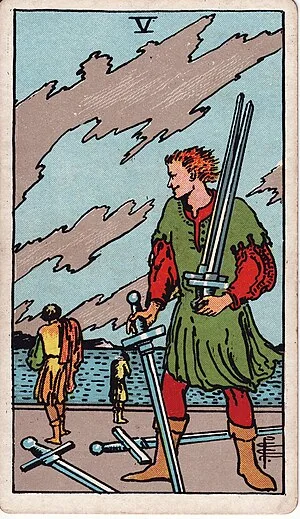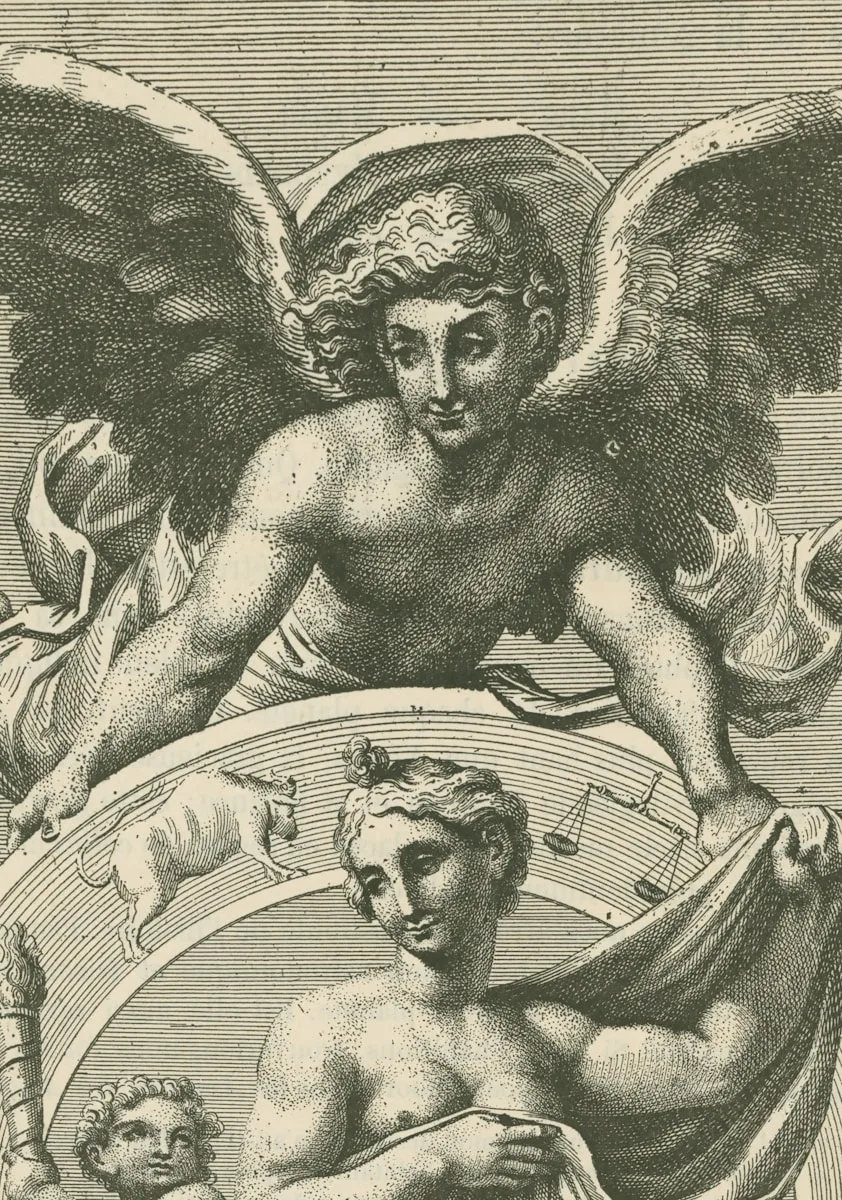 | Upright: Conflict, victory, ambition, loss, tension Reversed: Reconciliation, regret, peace, surrender, relief |
The Five of Swords probes the cost of triumph; you may emerge the victor in a clash, yet find yourself surrounded by wreckage and solitude. It speaks to both the thrill of winning and the bitter aftertaste it can leave. This card challenges you to ask: is victory worth it at any price?
Numerological Value
The Five of Swords carries 5, a number of change, strife, and imbalance. In tarot, five marks a disruptive shift—a moment where old patterns break, urging a search for new footing.
Element
Linked to Air, this card ties to intellect, communication, and logic. Air sharpens the Five of Swords with keen strategy, though it can also bring detachment and chill.
Astrological Value
Associated with Aquarius and influenced by Venus, the Five of Swords blends Aquarius’ independence with Venus’ yearning for harmony, highlighting the tension between conflict and peace.
General Meaning of the Card
| Upright Meaning | Reversed Meaning |
|---|---|
| Winning at all costs | Letting go of conflict and reconciling |
| Conflict and strain | Regret and seeking peace |
| A victory laced with loss | Tension easing and relief |
| Ambition leading to isolation | Learning from past mistakes |
| Ruthless yet calculated moves | Surrender and healing |
| Card’s Message: | Card’s Message: |
| – Winning isn’t always triumph! | – Peace takes courage to claim! |
| – Look around—what’s the cost? | – Forgive the past, face forward! |
| – Question your drive, was it worth it? | – Drop the fight, find calm! |
“Weigh your victory, see its price—peace might be your truest gain!”
Love and Relationship Readings
Upright Meaning
In love, the Five of Swords flags tension and disputes. You might lock horns with your partner in a power struggle—someone wins, but it widens the rift. If single, past conflicts may keep you guarded.
Reversed Meaning
Reversed, love softens into reconciliation. A lingering spat with your partner fades as you find common ground. If single, you release an old hurt, opening up to hope again.
Career and Work Readings
Upright Meaning
At work, the Five of Swords points to rivalry and friction. You may outshine a colleague, but it sours ties—your ambition could breed resentment.
Reversed Meaning
Reversed, workplace strife settles. A dispute resolves, or you step back from the fray—peace returns, though reflecting on past missteps matters.
Finances and Money
Upright Meaning
Financially, the Five of Swords warns of risky gains or disputes. You might win a monetary battle, but trust erodes—greed could cost you more down the line.
Reversed Meaning
Reversed, money tensions lift. A financial clash ends, or you mend a past error—stress fades, and stability creeps back.
Personality and Archetypes
Upright Meaning
Upright, it’s a driven, tactical soul. The “Victor” archetype thrives on conquest but risks isolation through a lack of warmth.
Reversed Meaning
Reversed, it’s a conciliatory, reflective spirit. The “Peacemaker” archetype drops the fight to mend bonds.
Health
Upright Meaning
In health, stress and mental fatigue loom. Conflicts drain you—sleep falters, anxiety spikes.
Reversed Meaning
Reversed, health finds calm. Stress unwinds, your mind and body mend—peace settles in.
Yes/No
Upright Meaning
No—Victory now may not serve you.
Reversed Meaning
Yes—Peace and progress are within reach.
Symbolism of the Card
The Five of Swords’ imagery bares its tangled heart. A man clutches three swords, a smug glint in his eye, while defeated foes trudge away, heads low. Two more swords lie scattered—battle’s remnants, victory’s toll. The sky broods gray and stormy, hinting peace remains elusive, tension still thick. His stance boasts success, yet whispers of solitude; the swords embody sharp wit and strategy, but also ruin. The losers’ retreat screams despair. This tableau sums up the Five of Swords: triumph exists, but at what price? Its symbols converge on a truth—winning can hollow out more than it fills, leaving relationships or inner calm as the true casualties.
General Description of the Card
The Five of Swords slices through life like a double-edged blade—victory’s rush on one side, its hollow echo on the other. In myth, it recalls Pyrrhus, who won battles only to lament, “One more victory, and I’m undone”—a gain shadowed by steep loss. It mirrors the “Lone Warrior” of epics, felling foes yet standing solitary when the dust clears. Psychologically, it brushes Jung’s “shadow self”—ambition and ego run wild, feeding a darker hunger. Freud might see it as a power play, reflecting buried fears of isolation beneath the drive to dominate.
Forged in Air, this card hums with mental acuity and cold logic; but unchecked, that clarity cuts too deep. It’s the hush after a storm—combat’s done, yet the air crackles. The Five of Swords asks, “Is this win truly yours, or a mirage?” It’s both warning and mirror; the lure of triumph can blind you, but where does it lead? Balance is its plea—glory tempts, but ignoring the fallout turns it sour. This card beckons you to face that paradox and peer past your pride; real strength lies not just in winning, but in grasping what’s won.
Upright Meaning Explanation
When the Five of Swords stands upright, it’s like stepping off a battlefield victorious, yet the silence feels heavier than the clash. Say you’ve won an argument with your partner—your point’s proven, but they storm off, leaving a chill between you. Or at work, you snag a promotion over a rival; cheers fade, and suddenly, colleagues eye you warily over coffee. This card captures that bittersweet sting—yes, you’ve prevailed, but the taste sours fast. Your ambition’s sharp edge carved a path, but the trail’s littered with trust and bonds lost.
Think of it as a chess match—you’ve checkmated your opponent, but the board’s toppled, pieces strewn. The Five of Swords congratulates you, then probes: “Now what?” That smug stance fuels your ego, yet loneliness lurks in its shadow. Maybe you outtalked a friend, proved your rightness, but your phone stays quiet that night. It urges you to live this moment yet weigh it—did your drive pay off, or just pave a lonelier road? The Five of Swords pushes you to look beyond the win; tally the cost, for sometimes the deepest wounds are the ones you don’t see.
Reversed Meaning Explanation
Reversed, the Five of Swords signals retreat from the fray—either you lower your blades, or life nudges you toward peace. Picture a drawn-out spat with your partner; you ditch the need to be right, say, “Let’s fix this,” and the air lightens. Or at work, you bow out of a rivalry—someone else takes the lead, and your shoulders unclench. This card marks conflict’s end and healing’s start; victory’s allure fades, replaced by a yen for calm. Regret might whisper, “I pushed too hard,” but it’s a release, not a shackle.
It’s a breather—the swords drop, the sky clears. Maybe you apologize, or a friend offers a hand; that hard shell cracks, letting relief seep in. Reversed, the Five of Swords says, “Enough”—ambition bows to understanding, the win-lust trades for quiet. It’s not a fairy-tale fix; scars linger, but they’re not raw. Perhaps a family feud cools—you’re laughing at the table again, though echoes of tension hum faintly. The card murmurs, “Let it go, move on”—war’s over, now’s for mending. The Five of Swords reversed promises peace isn’t lost; it’s yours to reclaim with a step forward.







